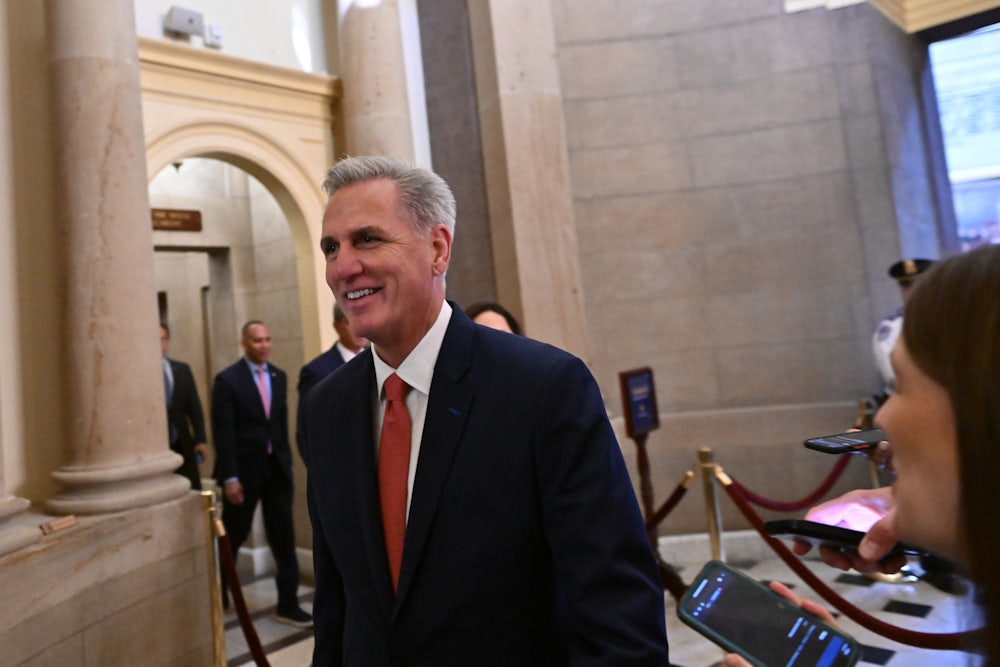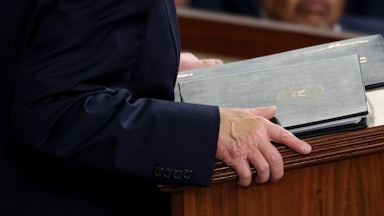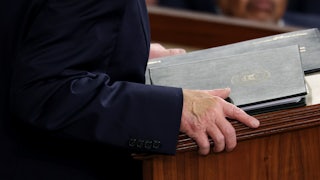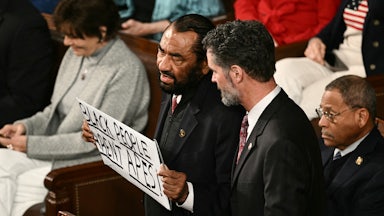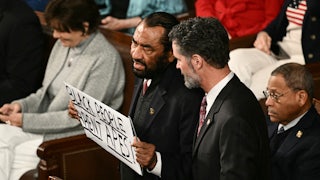Just two weeks after agreeing to specific spending caps as part of the deal to avoid defaulting on the nation’s debts, House Speaker Kevin McCarthy consented to even deeper cuts to induce cooperation from a disgruntled, recalcitrant faction of his conference’s ultraconservatives.
One problem with this plan: The House is not the only chamber in Congress. McCarthy’s pledge to hold spending to 2022 levels, which would result in $120 billion more in spending cuts, figures to set up a confrontation with the upper chamber, which is controlled by Democrats (although few Senate Republicans are likely to support the House deal). Abandoning the deal between McCarthy and Biden—which Congress passed with bipartisan majorities—would “all but guarantee a government shutdown,” said Representative Rosa DeLauro, the ranking Democrat on the Appropriations Committee. “How do you renege and walk away from the law of the land?”
The situation illustrates the precariousness of both the Republican House majority and McCarthy’s speakership. He made the new spending deal because a small group of vocal right-wingers—incensed by McCarthy’s deal with Biden—had functionally shut down the chamber by bucking their party on procedural votes. But in ending a House shutdown, he might have teed one up government-wide.
His deal is already a dead letter in the upper chamber. Senate Majority Leader Chuck Schumer said on Tuesday that he didn’t think capping spending at fiscal year 2022 levels “would have much support in the Senate among Democrats or Republicans.”
“They can do whatever they want, but that won’t be enacted,” Senator Brian Schatz, a Democrat who sits on the Appropriations Committee, told me on Tuesday.
Congressional Democrats and many Senate Republicans had already grumbled about the Fiscal Responsibility Act—the deal negotiated by McCarthy and President Joe Biden—with Democrats frustrated by the discretionary spending caps, and Republicans particularly concerned about spending for defense being kept at fiscal year 2023 levels. GOP hawks such as Senator Lindsey Graham already thought that national security spending plans were insufficient, even though defense spending for fiscal year 2024 would be up by 3 percent from current levels.
The House proposal would slash funding for nondefense programs to fiscal year 2022 levels, with significant cuts affecting the Departments of Labor, Education, Health and Human Services, Transportation, and Housing and Urban Development. House Republicans have also floated defunding portions of the Justice Department, with Representative Marjorie Taylor Greene announcing she would introduce an appropriations rider to revoke funding for special counsel Jack Smith’s investigation into former President Donald Trump.
Representative Pete Aguilar, the chair of the House Democratic Caucus, said that the proposal to cap spending at 2022 levels “very well could” increase the chance of a government shutdown. “It’s shocking that it took less than two weeks for Republicans to walk away from an agreement that they made,” Aguilar told reporters on Tuesday. “If it wasn’t so dangerous, it would be laughable.”
Senator Jack Reed, a Democrat on the Appropriations Committee, told me that it would be “chaotic” if House Republicans did not hold to the debt limit deal, but painted the problem as more of an internal issue within the House than a looming battle between the two chambers. “The showdown will be within the House on spending, and then over here, my sense is that we’re going to try to conform to the agreement,” Reed said.
House Appropriations Committee Chair Kay Granger said on Monday that the caps implemented by the Fiscal Responsibility Act were “a ceiling, not a floor.” She echoed McCarthy’s own rhetoric from last week, when he told reporters that “we can always spend less.”
Representative Tim Burchett, one of the House Republicans who held up procedural votes last week, tried to frame the idea of further spending cuts as a compromise agreement, never mind that the Biden administration already considered the debt ceiling agreement with McCarthy to be a compromise. But he also appeared open to the possibility that the Senate may not be copacetic with caps at 2022 levels.
“We’ve got to get realistic about where we are and what we can do,” Burchett said. “The art of compromise is that you know what you can live with, and you swing back to that, and you say, ‘Hey, this is not everything I wanted,’ and you walk away snickering, because it’s everything you wanted.”
Representative Tom Cole, a key Republican on the Appropriations Committee, said that even if House Republicans cannot get spending caps to fiscal year 2022 levels, conservatives will accept something less “if they know we’ve fought as hard as we can.” “The reality is, we have to deal with a Democratic Senate that has to produce a bipartisan product in the end,” Cole said. But if conservative Republicans aren’t convinced that McCarthy gave it his all, they could use more procedural maneuvers to gum up the works in the future.
Yet some senators are already gearing up to spend more. They have called for a supplemental spending bill to increase defense outlays this year, although McCarthy has been cool to the idea. Senator Chris Coons, the chair of the Appropriations subcommittee which oversees spending on foreign aid and initiative, raised concerns about the proposed cuts and the lack of interest in increasing spending. “I don’t understand how anyone could responsibly urge that level of cut in diplomacy and development in a moment in global history when the world is asking for more engagement from the United States, not less,” Coons told me.
Complicating matters, both the House and Senate Appropriations Committees are aiming to fund the government by going through “regular order,” which requires enacting 14 distinct government funding bills by the end of the fiscal year on September 30—a procedure which has not been successfully completed since 1996. So if the House and Senate cannot resolve their differences by then, it could result in a government shutdown. Moreover, in an effort to incentivize regular order, the debt limit deal included a provision triggering an automatic 1 percent cut to both defense and nondefense spending if Congress and the White House cannot agree on government spending, meaning that the country would ring in the fiscal new year with steep cuts.
But even as the House mulls its own spending cuts, senators continue to insist they will move forward on appropriations bills on a bipartisan basis. “Senator Collins and Senator Murray have been working diligently to make sure that we do what we need to on this side to get back to regular order to pass bills,” said Republican Senator Katie Britt, referring to the ranking member and chair of the committee. For her part, Collins told reporters that the Senate and the House would do their own things.
Cole also framed the House proposal as an early move in negotiations. “This is always a process, where you start in one place, and end up in another,” said Cole. “These are going to be Republican bills. So our job is to make sure we can get a product through, and sit down and negotiate from there. But the better negotiating position would be a lower number, for us.”
Senate Minority Leader Mitch McConnell also indicated that he believed that whatever came from the House would not be the final product, saying that the Senate would mark up its own appropriations bills as the House wrote its spending package. “It’s not totally uncommon for these to be different as they move through the process, and I think that’s probably what’s going to happen this time,” McConnell said.
Schatz told me that the proposed spending caps could embolden the “adults” in the House Republican conference, but also said that “there’s a scenario where this is the beginning of a really messy situation.” “But I’m not too worried,” Schatz continued. “This is relatively early days, and the Senate is looking forward to moving forward on a bipartisan basis.”
